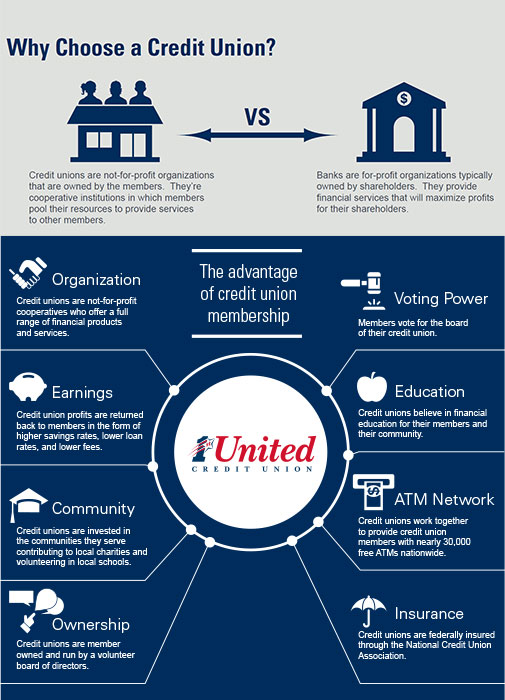Credit Unions in Wyoming: Comprehensive Banking Solutions and Member Conveniences
Wiki Article
The Ultimate Overview to Comprehending Lending Institution
Debt unions stand as one-of-a-kind monetary entities, rooted in principles of common support and member-driven procedures. As we navigate via the intricacies of credit score unions, an insightful trip awaits to lose light on these member-focused establishments and how they differ from traditional banks.What Are Credit History Unions?
Cooperative credit union are member-owned monetary organizations that offer a variety of banking services to their members. Unlike traditional financial institutions, credit scores unions operate as not-for-profit companies, implying their primary focus is on serving their members as opposed to making the most of profits. Participants of a lending institution generally share an usual bond, such as working for the same company, coming from the very same neighborhood, or belonging to the exact same organization.One of the crucial benefits of credit history unions is that they frequently use greater rates of interest on cost savings accounts and lower rate of interest on finances contrasted to financial institutions. This is because cooperative credit union are structured to benefit their members straight, permitting them to pass on their revenues in the kind of better rates and less fees. Furthermore, credit history unions are recognized for their individualized consumer service, as they prioritize building relationships with their members to understand their one-of-a-kind economic requirements and goals.
Background and Development of Lending Institution

The roots of member-owned financial cooperatives, understood today as cooperative credit union, trace back to a time when communities looked for alternatives to typical financial organizations. The concept of credit score unions come from the 19th century in Europe, with Friedrich Wilhelm Raiffeisen frequently attributed as the pioneer of the cooperative banking movement (Credit Unions Cheyenne). Raiffeisen established the first recognized cooperative credit union in Germany in the mid-1800s, highlighting community support and self-help principles
The development of credit score unions continued in The United States and Canada, where Alphonse Desjardins developed the very first lending institution in Canada in 1900. Soon after, in 1909, the first united state lending institution was created in New Hampshire by a team of Franco-American immigrants. These very early lending institution operated the basic principles of shared assistance, autonomous control, and participant ownership.
Gradually, lending institution have expanded in appeal worldwide due to their not-for-profit structure, concentrate on offering participants, and supplying competitive financial items and solutions. Today, credit rating unions play a crucial function in the financial sector, offering obtainable and community-oriented banking alternatives for people and services alike.
Subscription and Eligibility Requirements
Membership at a credit rating union is commonly limited to people meeting particular eligibility standards based on the organization's founding concepts and regulatory needs. Some credit scores unions may just serve individuals that live or work in a certain area, while others might be tailored to workers of a specific business or members of a certain association.Additionally, lending institution are structured as not-for-profit companies, implying that their main goal is to offer their members as opposed to generate revenues for investors. This focus on member solution usually converts right into even more individualized interest, reduced costs, and affordable rate of interest rates on lendings and cost savings accounts. By meeting the qualification standards and becoming a member of a lending institution, individuals can access a range of monetary items and solutions tailored to their certain demands.
Services and Products Provided
Among the vital elements that sets credit score unions apart is the varied variety of financial services and products they provide to their participants. Lending institution usually give typical financial services such as savings and inspecting accounts, loans, and bank card. Participants can likewise profit from financial investment solutions, consisting of pension and economic planning assistance. Many credit rating unions provide affordable rates of interest on interest-bearing accounts and fundings, as well as reduced fees contrasted to traditional banks.
Additionally, credit score unions usually supply practical online and mobile financial alternatives for participants to conveniently handle their financial resources. They may provide rewards such as common branching, allowing participants to access their accounts at various other cooperative credit union throughout the nation. Some cooperative credit union additionally supply insurance items like home, automobile, and life insurance policy to assist participants shield their properties and loved ones.
Along with economic services, lending institution frequently take part in area outreach programs and financial education and learning efforts to sustain their participants in accomplishing their financial goals.
Benefits of Financial With Credit Report Unions
When taking into consideration economic institutions, exploring the benefits of financial with credit history unions reveals unique benefits for participants seeking tailored service and competitive prices. Unlike large banks, credit unions are member-owned and prioritize building strong relationships with their members. In general, financial with a debt union can supply a more customized, cost-efficient, and member-centric monetary experience.Final Thought

Credit scores unions are member-owned monetary establishments that provide a range of financial solutions to their participants. The principle of credit report unions stem in the Wyoming Credit Union 19th century in Europe, with Friedrich Wilhelm Raiffeisen often attributed as the leader of the participating banking motion.The development of credit history unions proceeded in North America, where Alphonse Desjardins developed the first debt union in Canada in 1900. Credit scores unions typically provide traditional financial solutions such as financial savings and examining accounts, finances, and debt cards.When taking into consideration economic establishments, exploring the advantages of banking with credit scores unions discloses special advantages for members looking for customized service and affordable prices.
Report this wiki page